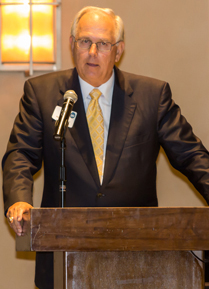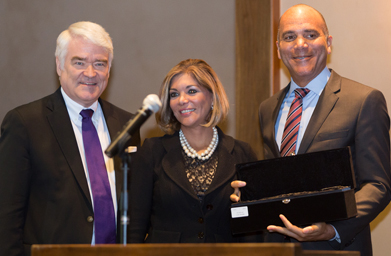© 2014 The Texas Lawbook.
By Janet Elliott (October 22) AUSTIN – Funding legal services for the poor has never been an easy sell.
The Legal Services Corporation, created by Congress in 1974, was a victim of its early success. Funding grew to $321 million by 1981. But LSC lawyers’ court victories over government and business interests created a backlash and soon influential conservatives were calling for its abolition.
“By 1984 legal aid was under attack. It was a dark time,” Bill Whitehurst said last week in a speech at the Texas Access to Justice Foundation luncheon kicking off Texas Pro Bono Week.
In Texas, the Legislature refused to pass a program to raise money through interest on the trust accounts lawyers held for clients. The State Bar of Texas ignored legal services in its budget, said Whitehurst, who served as State Bar president from 1986-87.

It fell to the Texas Supreme Court to create the state IOLTA program in 1984. When the court made IOLTA (Interest on Lawyer Trust Accounts) mandatory in 1989, legal service providers hoped that they had found a secure source of income that did not rely on the whims of politics.
The fighting was not over, however, and the action moved to the courthouse. In 1994, a conservative legal group challenged the Texas program as an unconstitutional “taking” of client funds.
The Texas case went to the U.S. Supreme Court, which ruled in 1997 that clients had a Fifth Amendment property right to interest earned on their funds. It was not until 2003, in a case involving the state of Washington, that the U.S. Supreme Court finally brought an end to the IOLTA challenges.
IOLTA was back on track, generating about $20 million for legal aid programs in 2007. The next year brought the Great Recession and interest rates fell to near zero where they have remained for the past six years. This year a diminished IOLTA will raise about $4 million for legal aid programs.
Despite the political and economic challenges, Whitehurst sees a “wholesale change of attitude from those dark days.”
Thirty years after the Texas Supreme Court created the initial voluntary IOLTA program, support for legal services is strong, Whitehurst said.
A survey by the University of North Texas estimated that Texas lawyers provide the equivalent of $500 million of free or indirect services to the poor.
“It has become part of the very fabric of our law firms and our law schools,” Whitehurst said.
Despite the efforts, a large unmet need for legal services remains. There is only one legal aid lawyer for every 11,000 Texans who qualify for help.
To offset the drop in IOLTA funds, the Texas Legislature in 2009 began budgeting for civil legal services at a rate of $18 to $20 million a year.
In 2013, the Legislature passed HB 1445, known as the Chief Justice Jack Pope Act after the jurist who pushed the initial IOLTA rule. The law is expected to generate up to $50 million per biennium for legal services through penalties received by the attorney general’s office in certain civil cases.
Chief Justice Nathan Hecht presented Legislative Hero Awards to the author of the bill, Rep. Senfronia Thompson of Houston, and the Senate sponsor, former Sen. Robert Duncan of Lubbock. Houston area Rep. Sarah Davis also was honored for working through the budget process to secure funding for legal services.

The Construction Law Section of the State Bar was recognized for contributing $245,000 in CLE proceeds for civil legal services since 2007.
Also recognized were Independent Bank, PlainsCapital Bank and Preston State Bank as prime partners who provide extraordinary interest rates through IOLTA.
Individual efforts also are helping.
Wallace Jefferson, who retired as chief justice of the Texas Supreme Court in 2013, has contributed $5,000 from his leftover campaign funds to legal aid programs. He is urging others who leave public office to follow his lead.
Justice Eva Guzman, the Supreme Court’s access to justice liaison, recognized Jefferson with an inaugural award named in his honor. As chief justice lobbying lawmakers for funding and now as a former officeholder donating his unspent campaign funds, Jefferson is “all in for access to justice,” Guzman said.
Accepting the award, Jefferson said access to legal representation is a nonpartisan issue.
“We’re not talking about politics,” he said. “We’re talking about human dignity.”
© 2014 The Texas Lawbook. Content of The Texas Lawbook is controlled and protected by specific licensing agreements with our subscribers and under federal copyright laws. Any distribution of this content without the consent of The Texas Lawbook is prohibited.
If you see any inaccuracy in any article in The Texas Lawbook, please contact us. Our goal is content that is 100% true and accurate. Thank you.
